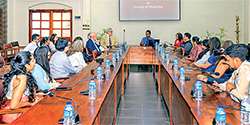Schools in Sri Lanka: A place to Study or Conduct Marketing Forums?
 Schools are trusted by parents and society as a safe place that children go to for studies. Although schools serve a wide variety of purposes, decades of research has shown that the most commonly mentioned purposes schooling tend to focus on three core elements: Civic development, Emotional development and Cognitive development. However, a fourth purpose seems to be emerging in Sri Lanka, as companies encroach on time meant for studies, and instead have marketing and advertising programmes.
Schools are trusted by parents and society as a safe place that children go to for studies. Although schools serve a wide variety of purposes, decades of research has shown that the most commonly mentioned purposes schooling tend to focus on three core elements: Civic development, Emotional development and Cognitive development. However, a fourth purpose seems to be emerging in Sri Lanka, as companies encroach on time meant for studies, and instead have marketing and advertising programmes.
Morality in Marketing
The question of morality doesn’t exist in the marketing field. Organizations are willing to do anything for an increase in profit, even if it means to sell to children. Unfortunately, today children’s get targeted by phone companies and- FMCG’s who promote everything ranging from biscuits to shampoo! Furthermore, education institutes conduct seminars in the guise of education, and then use the opportunity to persuade students to enrol in the ‘best foreign university’ with the ‘best facilities on par with international standards.’ It must be understood that while the marketing or advertising programme claims to be the ‘best’, that students may not have the ability to decipher as to if the product or service is truly the ‘best’. Their inherent naivety is manipulated in the advertises best interests.
Manipulation and Peer Pressure
Marketing and advertising that is targeted at children, can easily manipulate children to purchase products or services that are not appropriate for them or their families. Persuasion to purchase a product or service that is appropriate becomes a challenge, as advertisers direct their marketing strategies towards chil- dren. This results in parents dealing with stubborn children, demanding that they buy a specific product or go to a particular university. As the item or service is advertised in a programme conducted in school, children argue that the school endorses the product or service. This leads to spontaneous purchasing that is not in the best interests or above a families budget.
Children are tempted through samples of products or discounts and part scholarships. Therefore, they argue with their parents and decisions that are short sighted are taken. It is questionable as to why schools are endorsing such programmes and what they get out of it. Parents send their children to school assuming that it is a safe environment focused on studies and development. It is therefore shocking that this trust is misused through external programmes. It is therefore hoped, that schools and the government get their priorities right, and vet the programmes conducted in the schools.










































.jpg)
.jpg)
.jpg)
.jpg)
.jpg)
.jpg)
